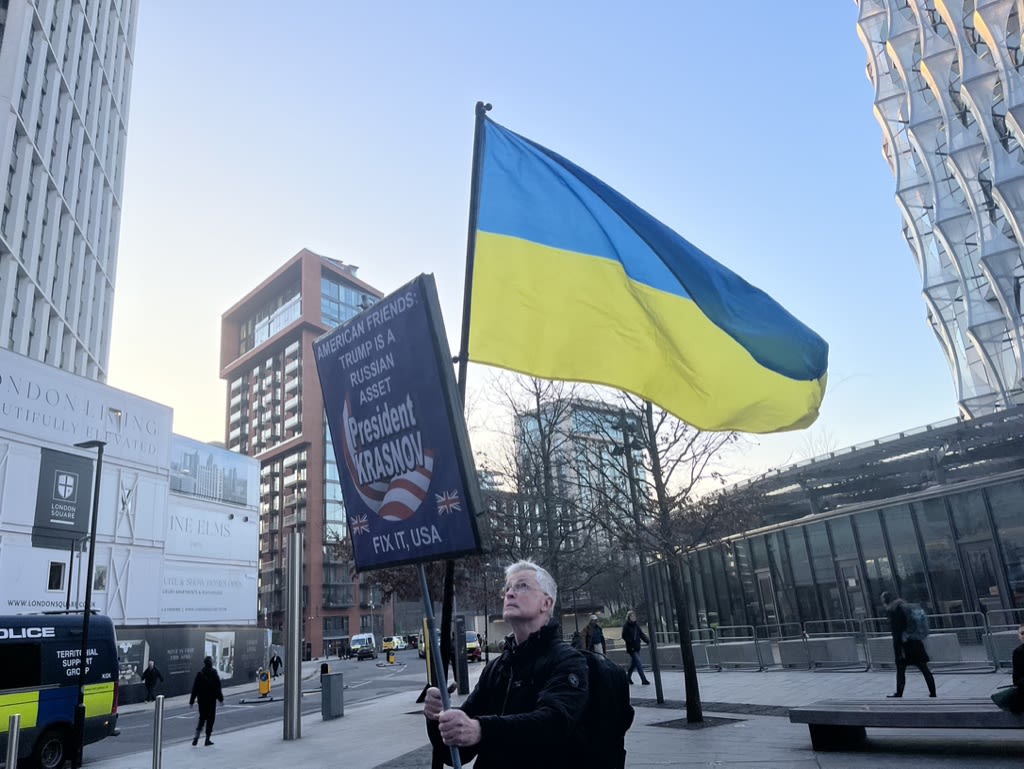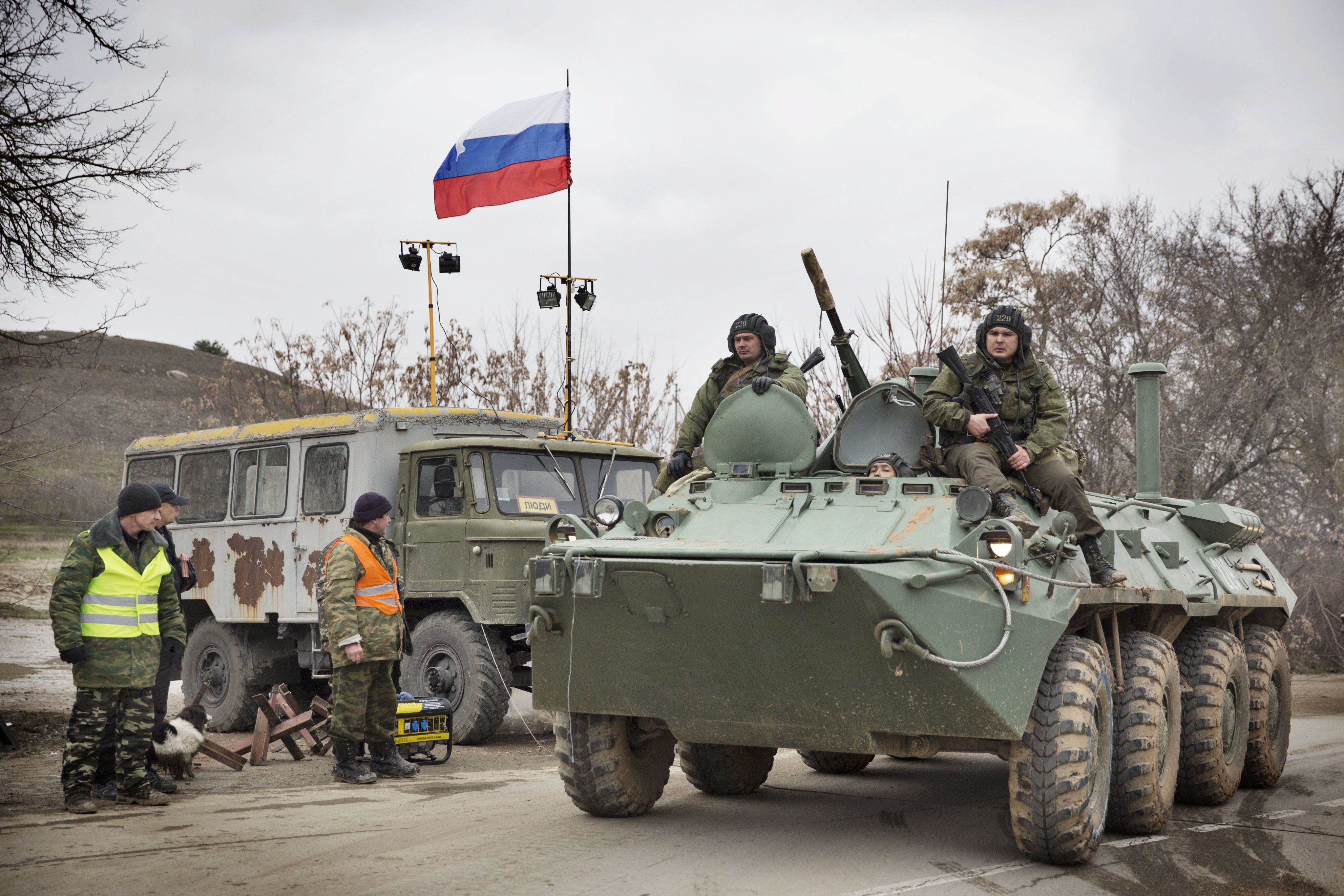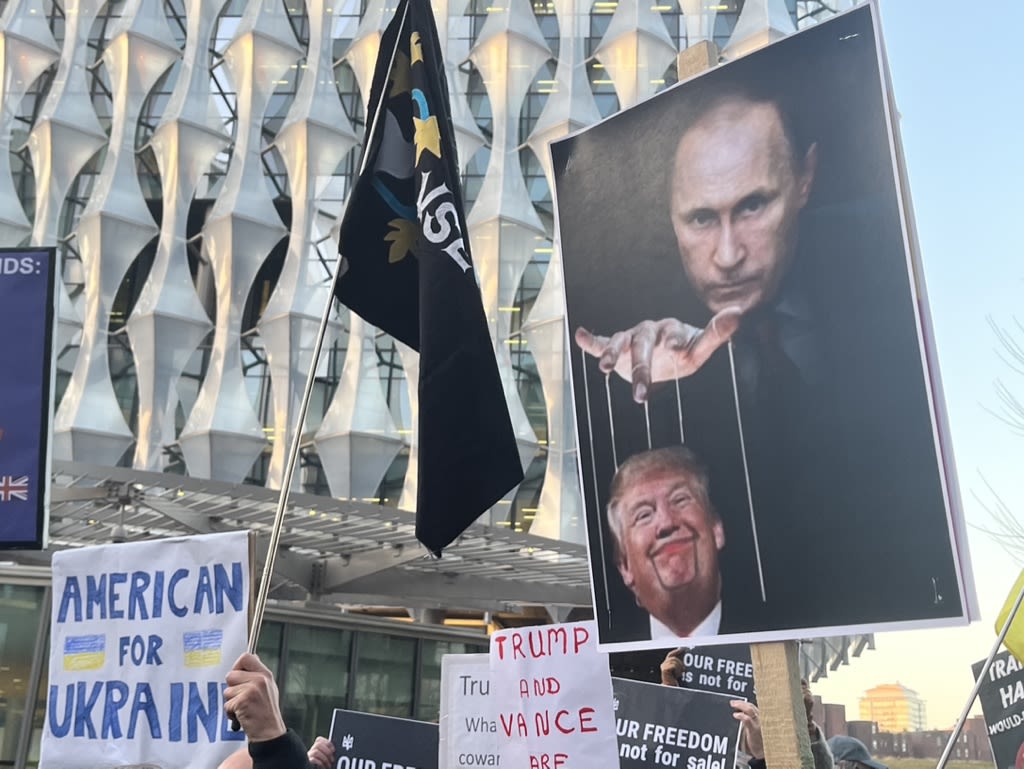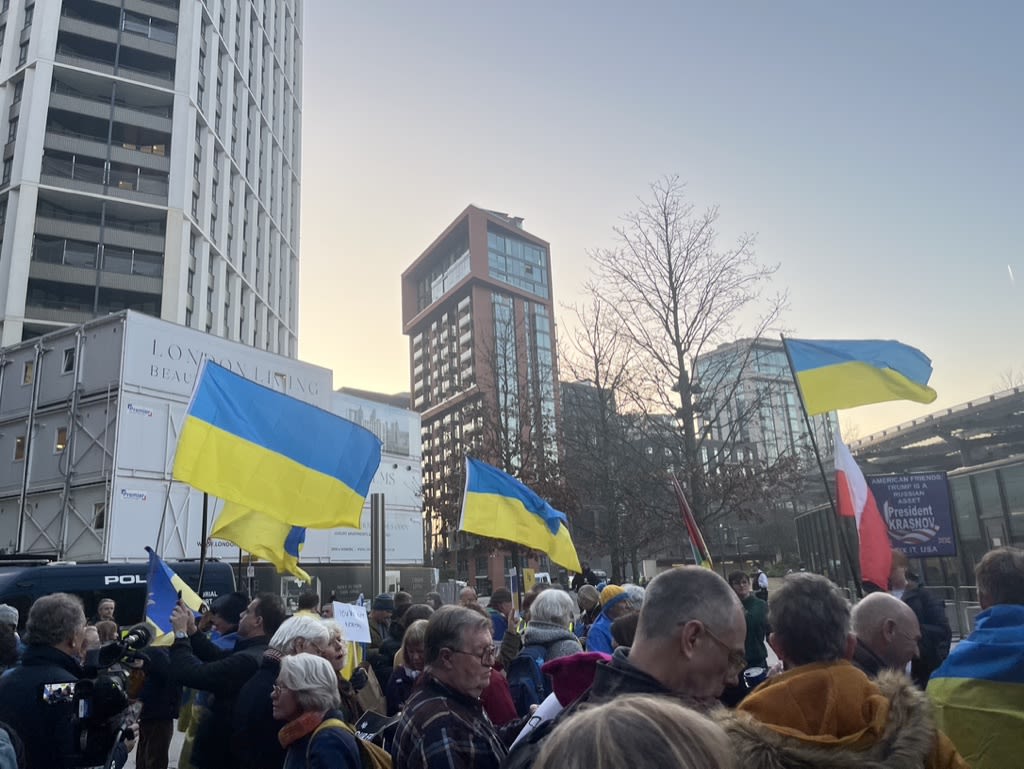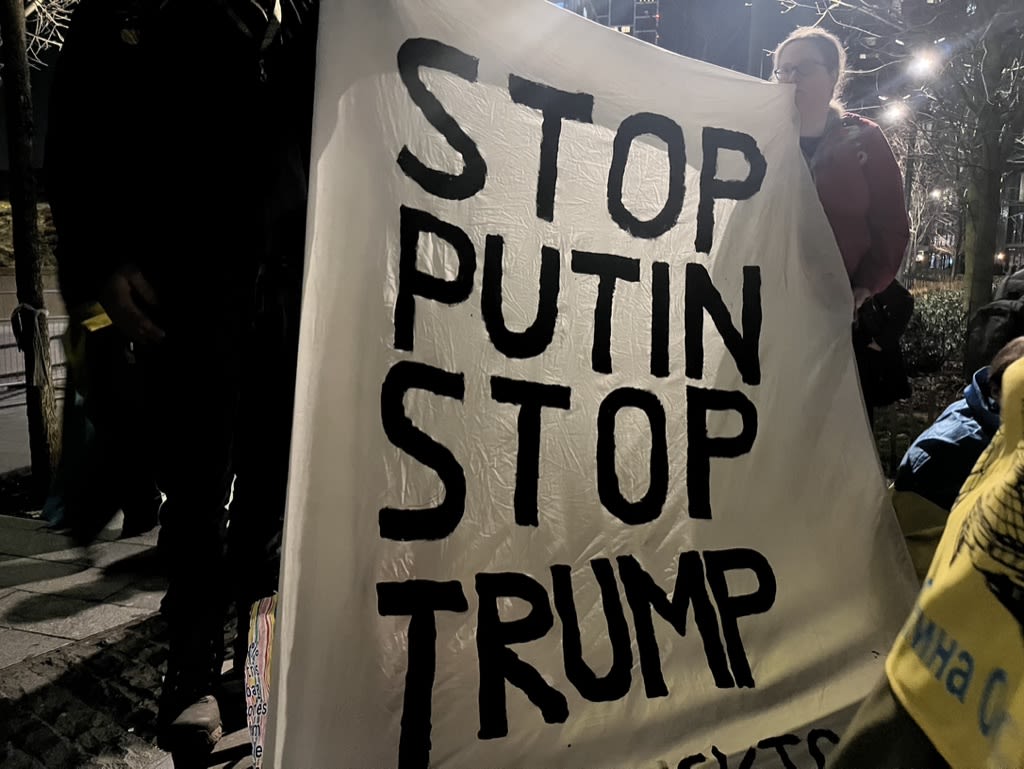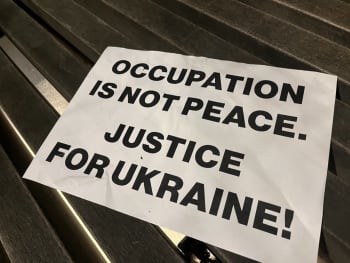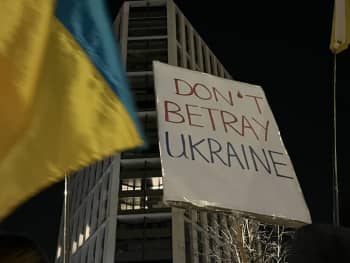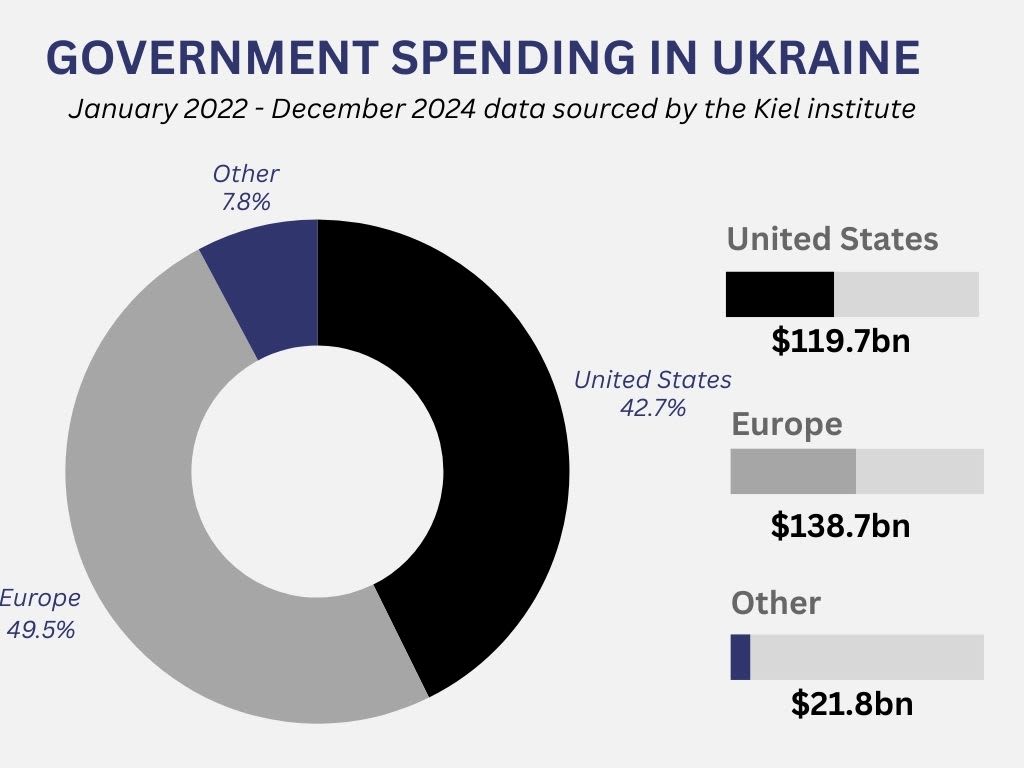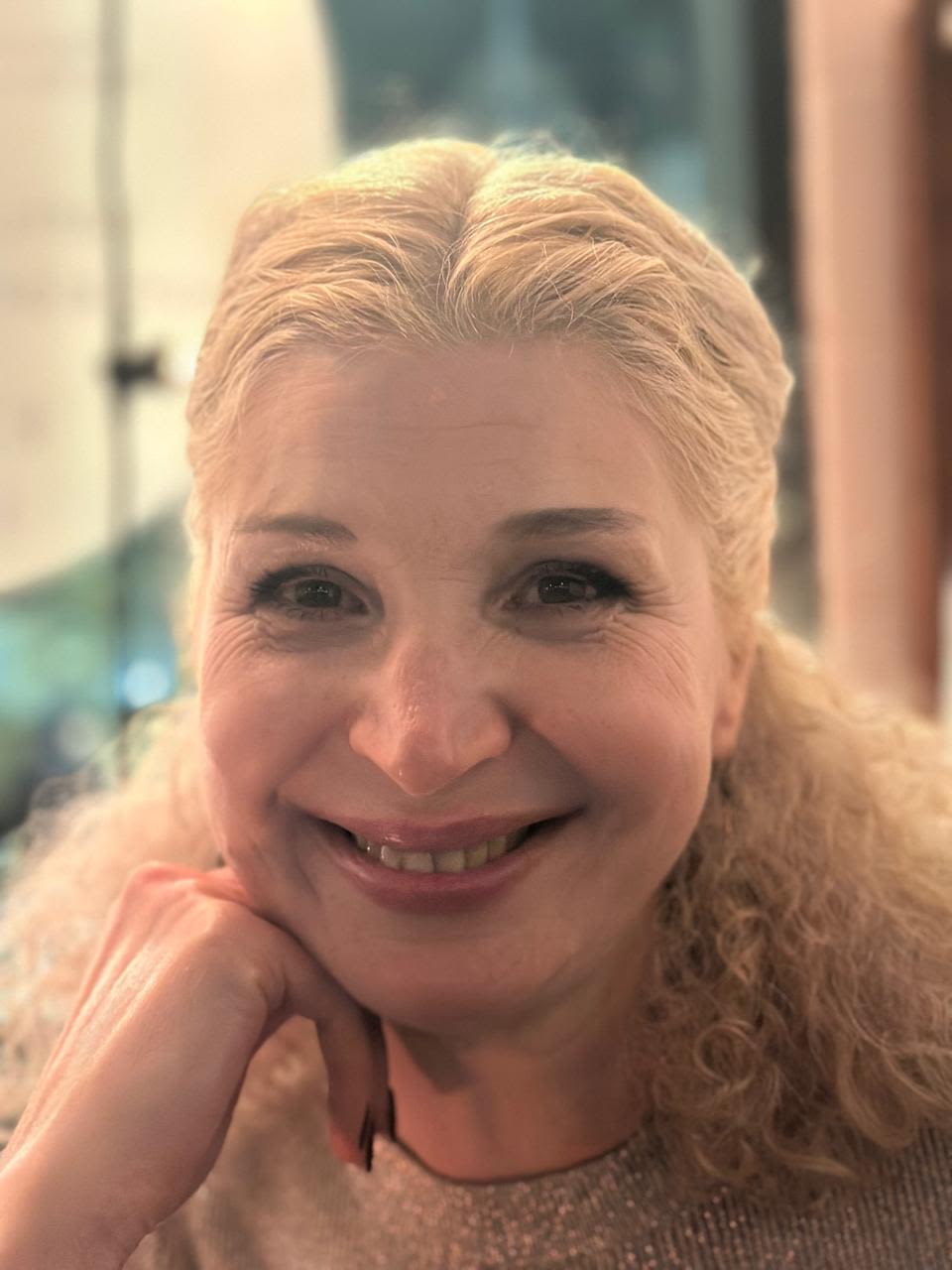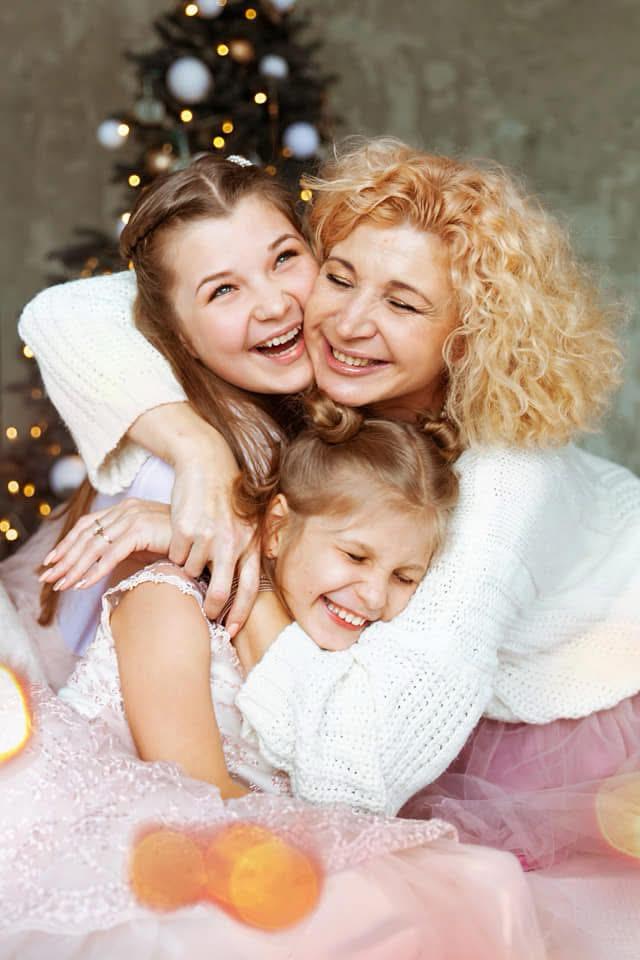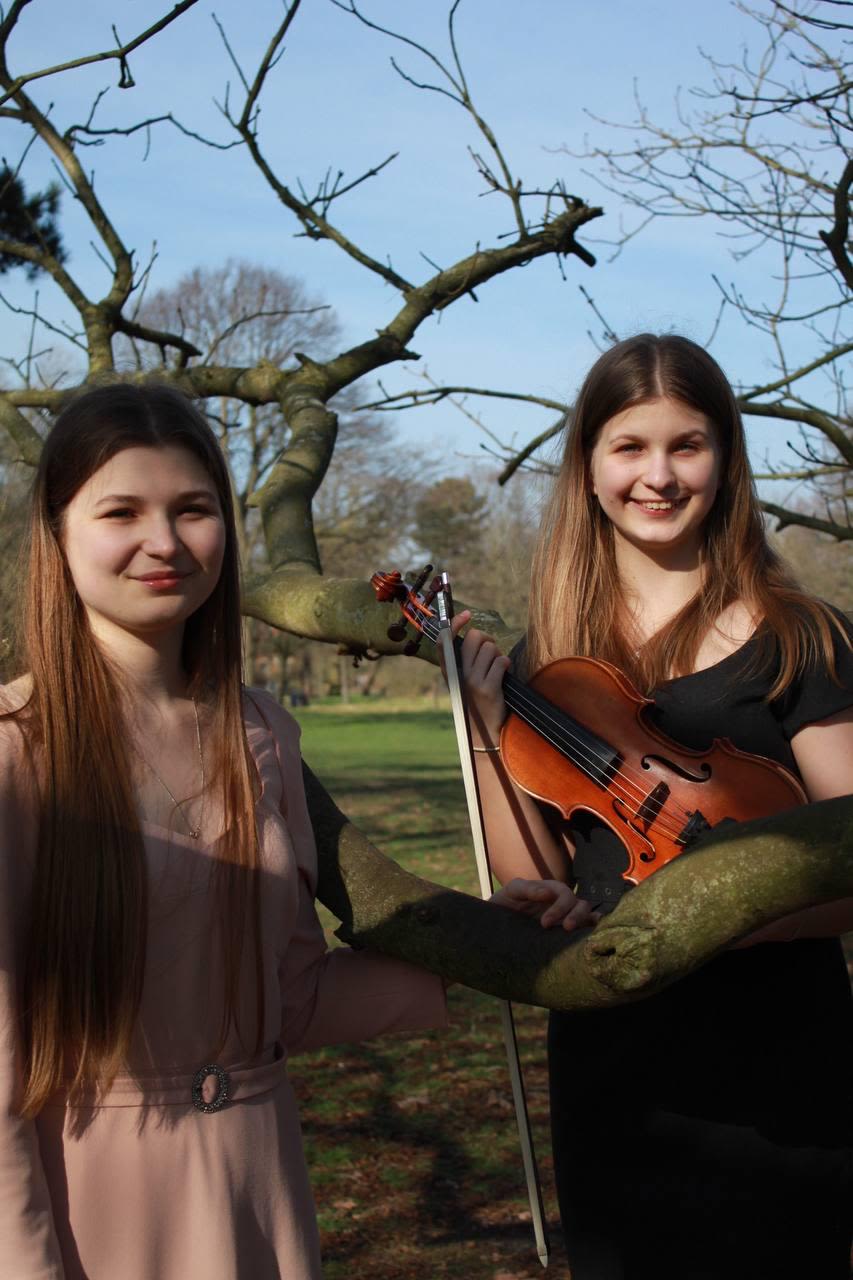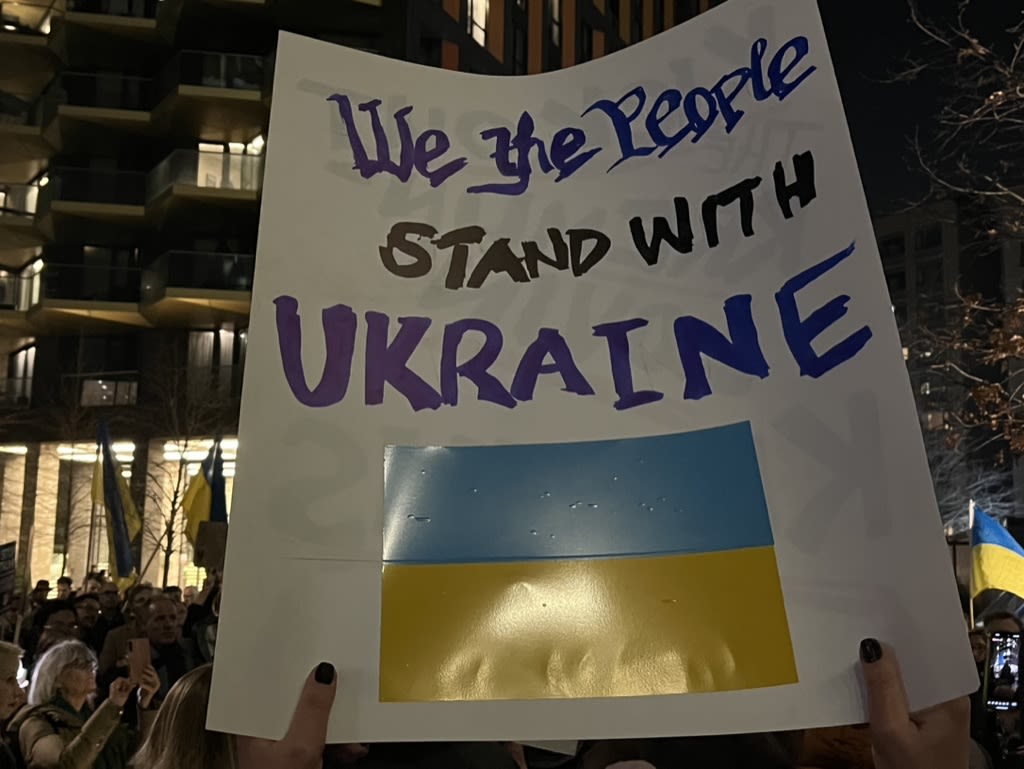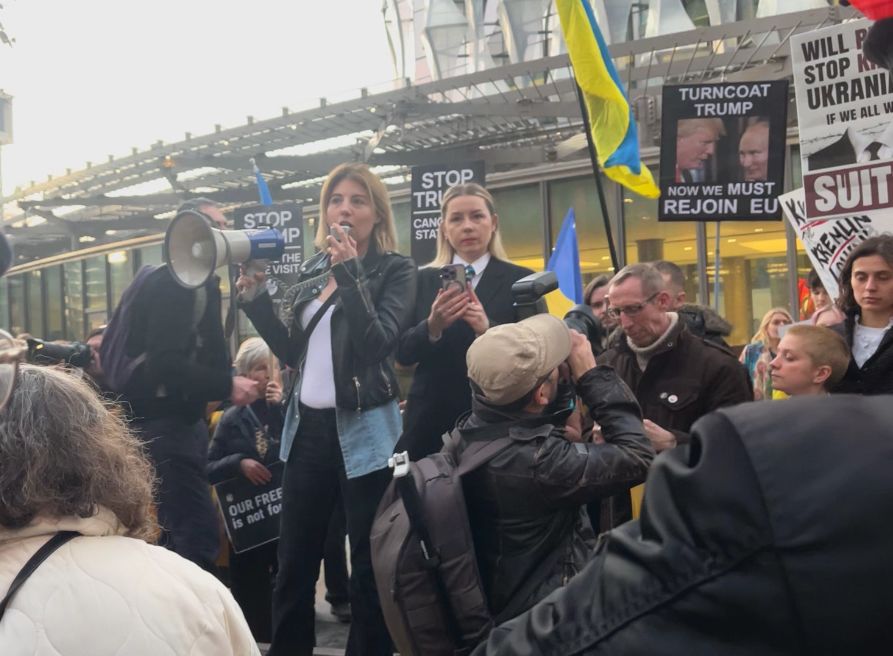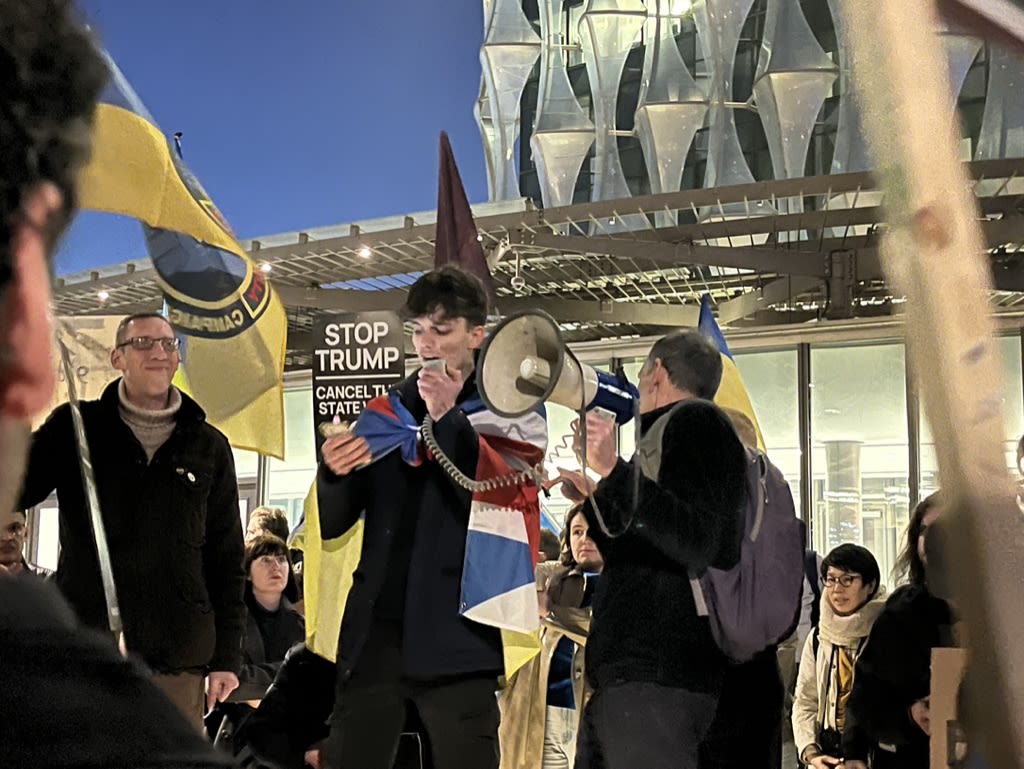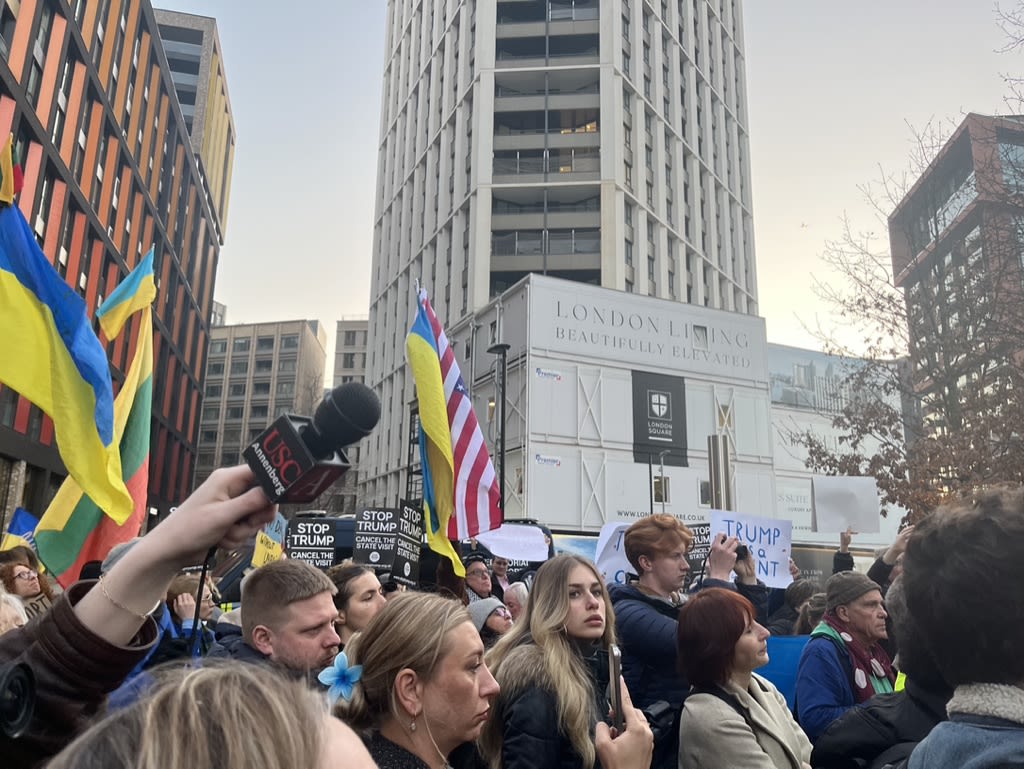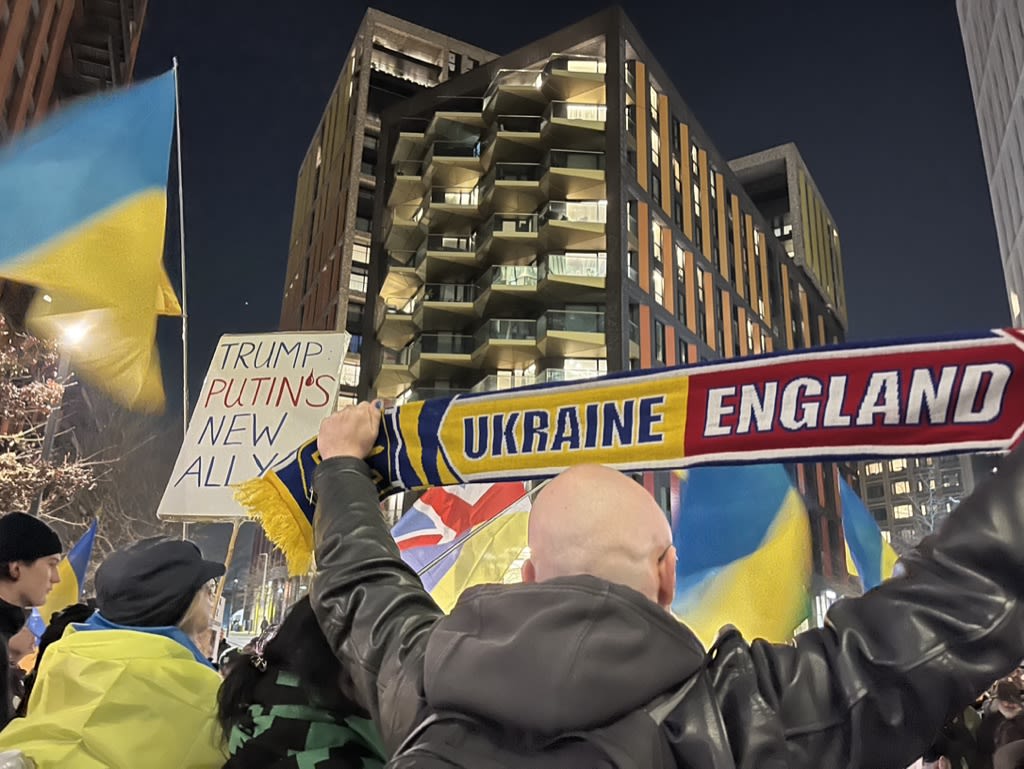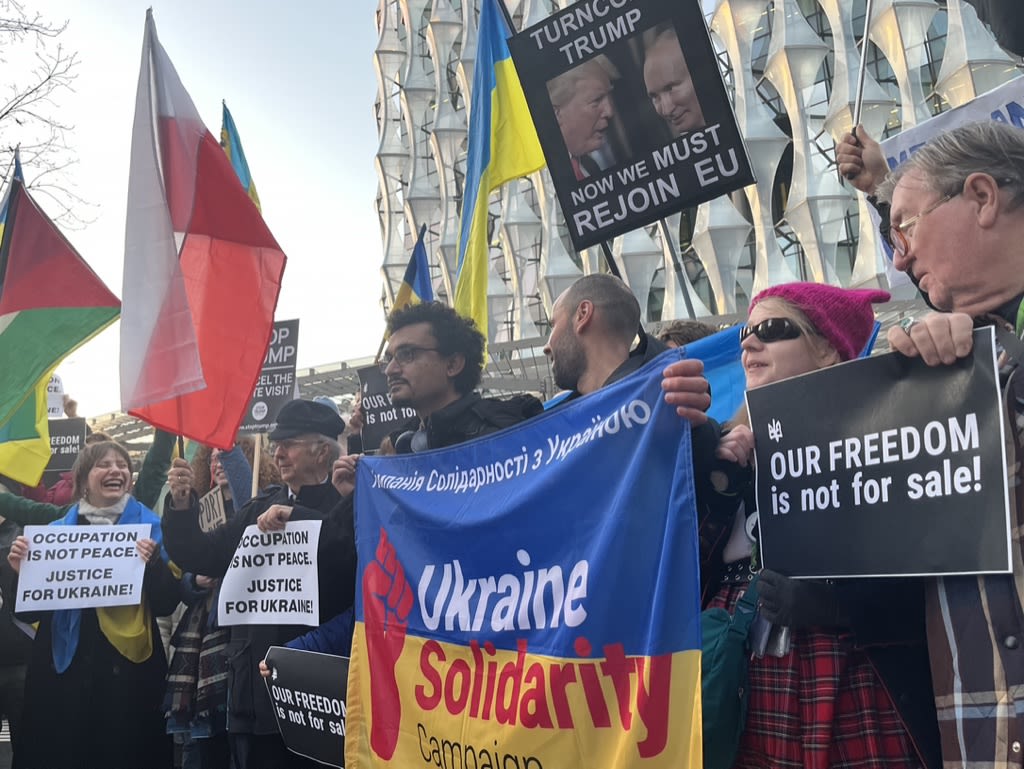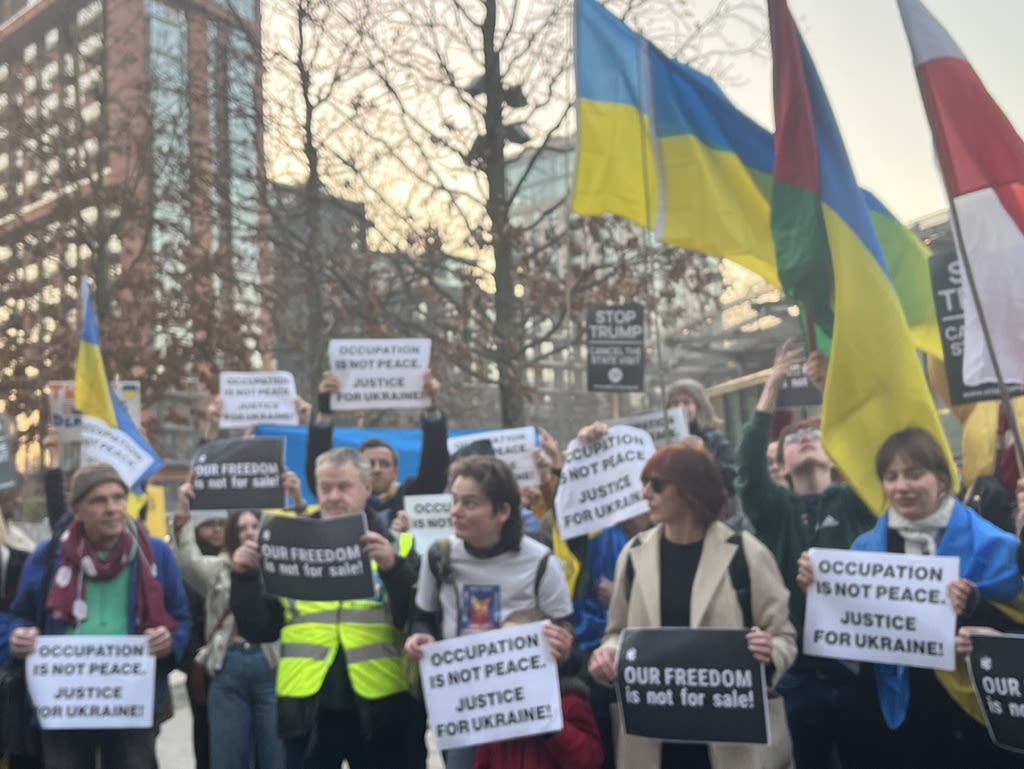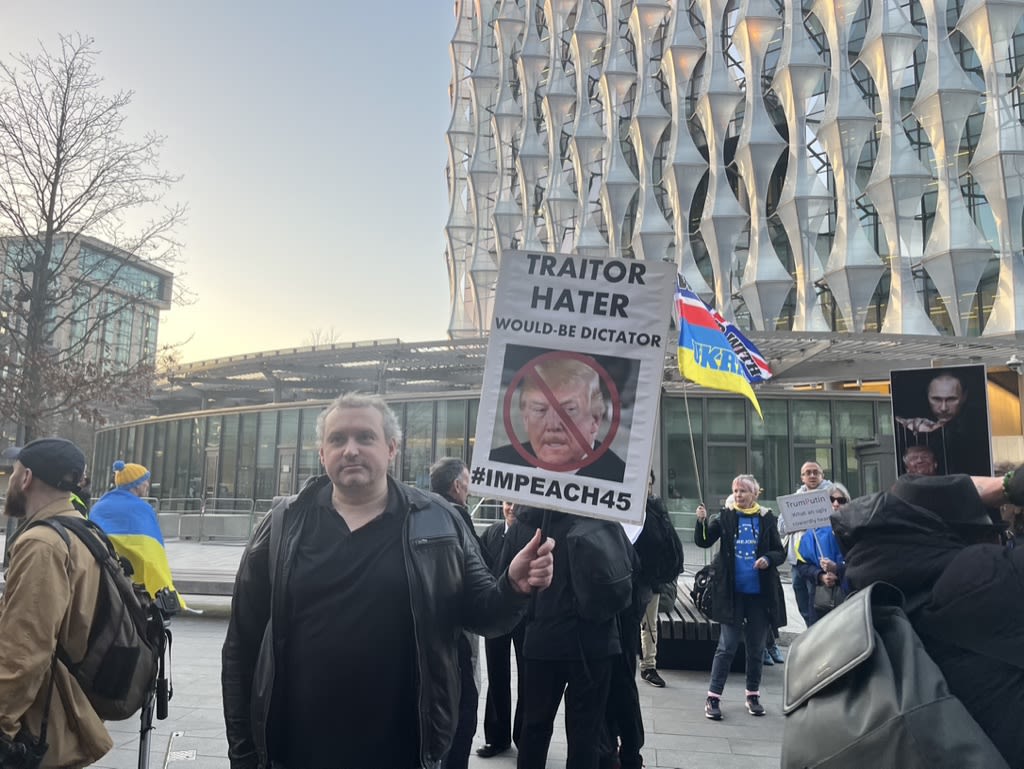Taking a stand:
London's response to Putin's war in Ukraine
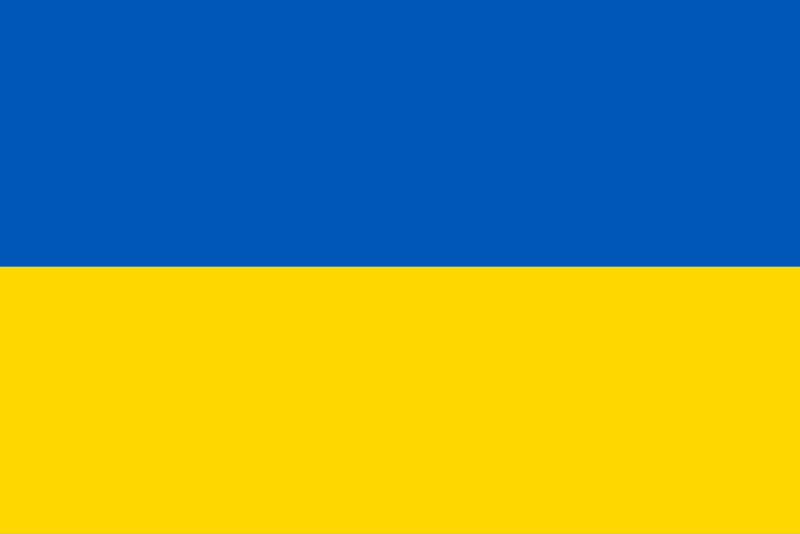
Protestors fly a flag in solidarity with Ukraine outside the US embassy in London following the Trump Administration's decision to freeze military aid (Credit: Henry Langdon)
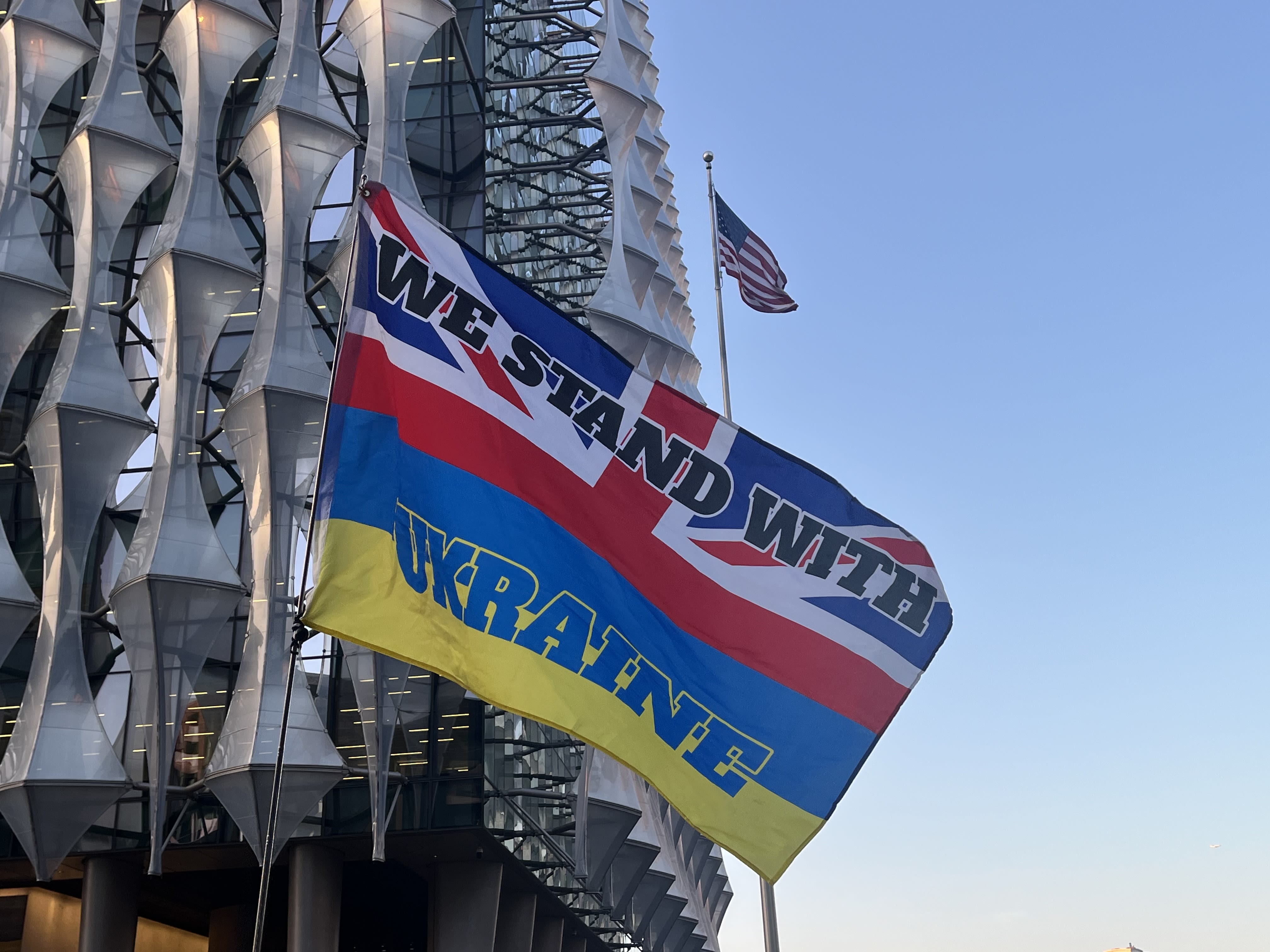
Protests outside the Russian Embassy
In the face of an uncertain future, political groups, politicians and ordinary people in London have rallied to stand up for the future of Ukraine.
On March 1, Team Navalny UK led a demonstration in front of the Russian Embassy to demand an end to the war, Putin's presidency and to remember Alexei Navalny, the former leader of the Russian opposition who died in Russian custody last year.
Demonstrators of all nationalities, including Russians, Ukrainians, Americans and Britons, marched together amongst cries of "stop Putin, stop the war".
Team Navalny is originally a Russian political group with branches across the world, it is considered an extremist organisation by the Russian government.
Many of its members are Russian but cannot return to their home country according to coordinator Maria Milysheva.
She said that many fear persecution at the hands of the government and some have already been extradited.
Milysheva herself cannot return to Russia as she was expelled from the country at the outbreak of war in 2022.
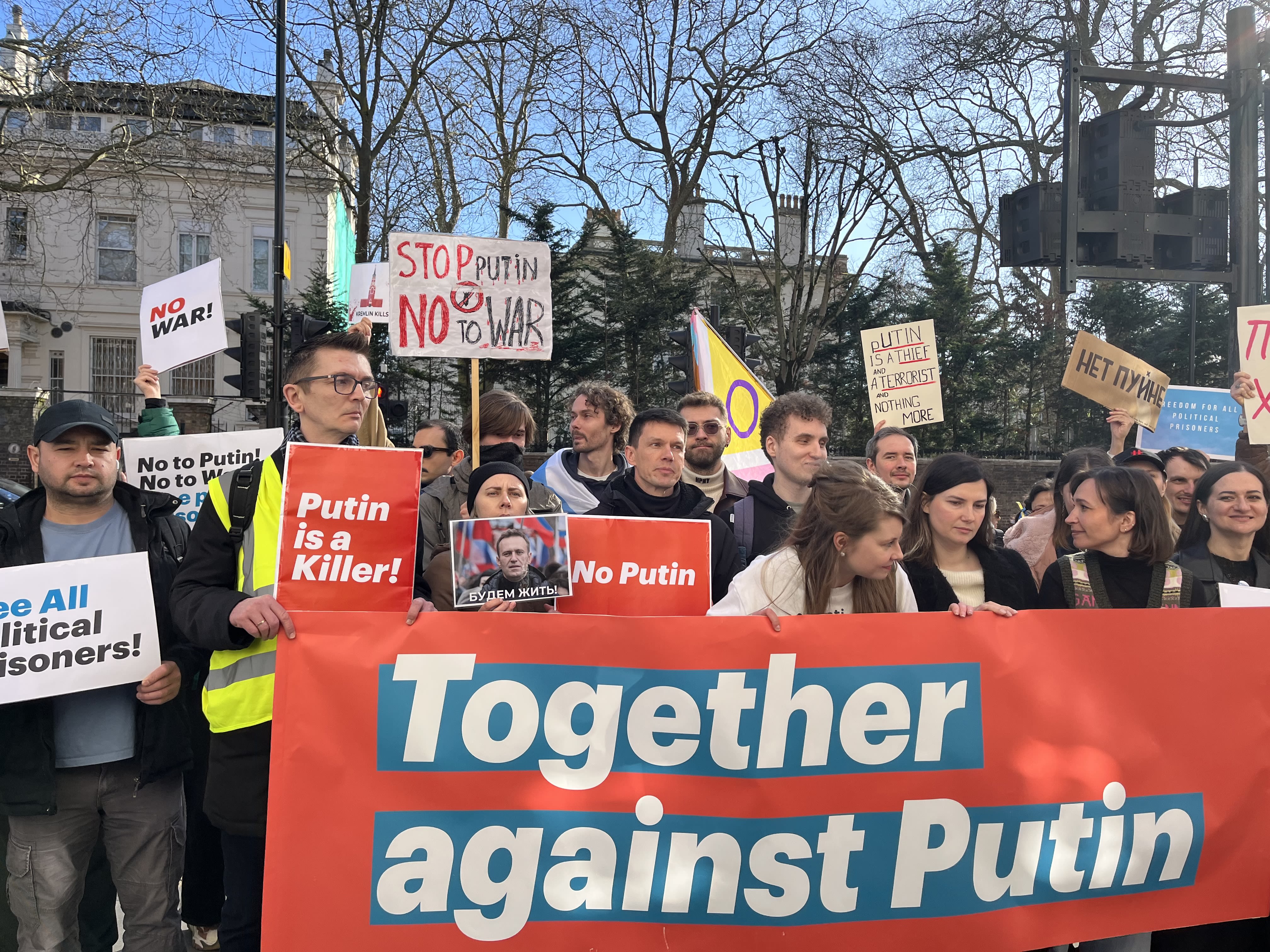
A protestor flies the Ukrainian flag in London (Credit: Henry Langdon)
A protestor flies the Ukrainian flag in London (Credit: Henry Langdon)
Russian military vehicles pass through a roadblock on the road from Sevastopol to Simferopol in 2014 (Credit: Jdd/Sipa/Shutterstock)
Russian military vehicles pass through a roadblock on the road from Sevastopol to Simferopol in 2014 (Credit: Jdd/Sipa/Shutterstock)
Putin has now been in power for almost as long as Joseph Stalin (Credit: Henry Langdon)
Putin has now been in power for almost as long as Joseph Stalin (Credit: Henry Langdon)
Protestors in London (Credit: Henry Langdon)
Protestors in London (Credit: Henry Langdon)
Protestors hold a sign in London (Credit: Henry Langdon)
Protestors hold a sign in London (Credit: Henry Langdon)
Timeline of events
Conflict between Russia and Ukraine did not begin in 2022, it has a complex background and history. Here is a timeline of all the most important events that have led to the current state of affairs.
December 26,1991: the dissolution of the USSR
In 1991, the Soviet Union collapsed, leading to the formation of new independent nations, including the Russian Federation and the former satellite Soviet Republic, Ukraine.
December 5, 1994: Ukraine surrenders nuclear weapons
Ukraine, once the host of a significant portion of the Soviet Union's nuclear catalogue, agreed to denuclearise in the Budapest Memorandum. The conditions of the agreement included security assurances from the United States, the United Kingdom and Russia.
February 20, 2014: Russia invades Crimea
Russia annexed the southern Ukrainian territory of Crimea, despite international condemnation, Putin is appeased and Russia is allowed to control the territory.
February 23, 2022: Russia invades Ukraine
Russian forces, which had been building at the border for months, stormed into Ukraine, initially threatening the fall of Kyiv and forcing the evacuation of millions. The full-scale invasion marked the start of the Ukraine War.
April 2, 2022: Battle of Kyiv ends in Russian retreat
The Russian retreat from Kyiv marked the start of a shift in the war and of Ukrainian counterattacks. Putin would soon rely on reserve troops as Ukraine pushed Russian forces further back to the border. Western, particularly US aid, was a crucial component to Ukrainian success on the battlefield.
January 20, 2025: Donald Trump inaugurated as 47th US President
Trump's policy on Ukraine marked a major shift in US support, leading to Zelensky being ejected from the White House and a pause in US aid and intelligence sharing to Ukraine in early March.
Where are we now?
The situation in Ukraine has changed dramatically since Biden left office. Crucial US support of Kyiv has wavered as the Trump administration looks to secure a peace deal as soon as possible.
There are doubts that the White House has the best interest of Ukraine in mind as the President has made a flurry of false claims on the situation.
Rachel Blundy, a fact checker at AFP, said: “Suggesting things like Ukraine starting the war is obviously false.”
Trump has also labelled Zelensky a dictator, misrepresented the amount of aid that the US has sent to Ukraine compared to Europe and inflated casualty numbers.
Blundy said that credible estimates are way off what Trump claimed: “He talked about millions of deaths which is not true.”
Other countries, including the UK, remain committed to Ukraine however. “Now is the time to put maximum pressure on Putin,” Kier Starmer said following a meeting of world leaders recently.
There are concerns that a forced peace deal may lead to further issues for Ukraine and Europe.
Licia Cianetti, lecturer of political science and international studies at the University of Birmingham said that it was “difficult to say” whether or not Putin would halt aggression if a peace deal was agreed.
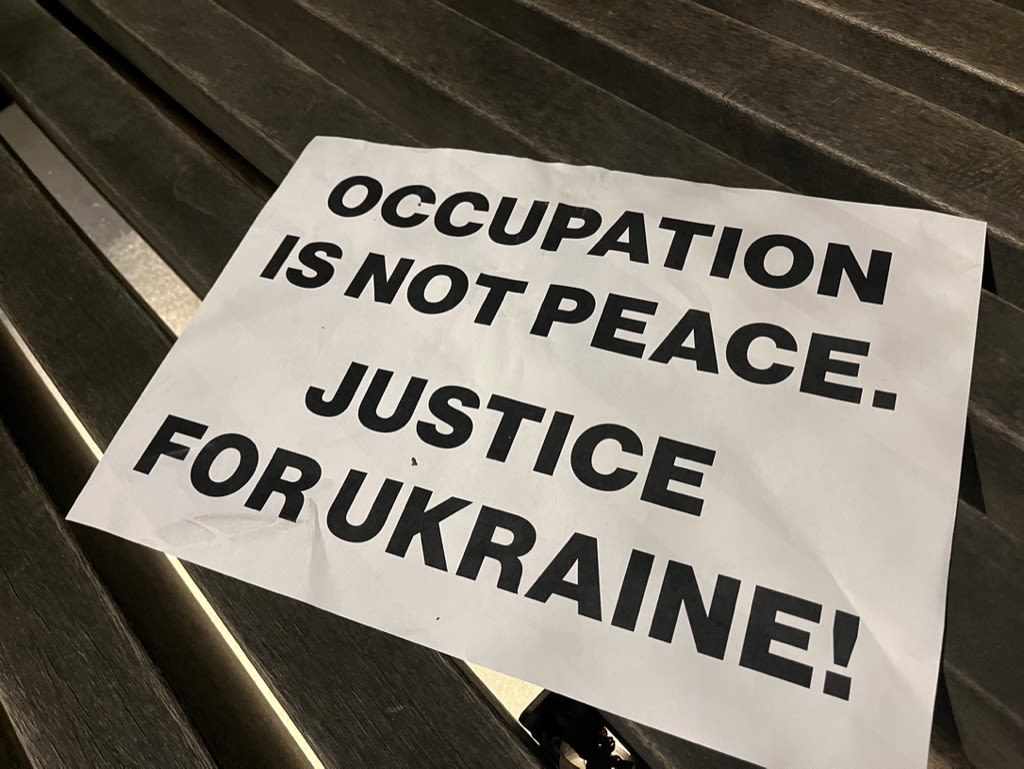
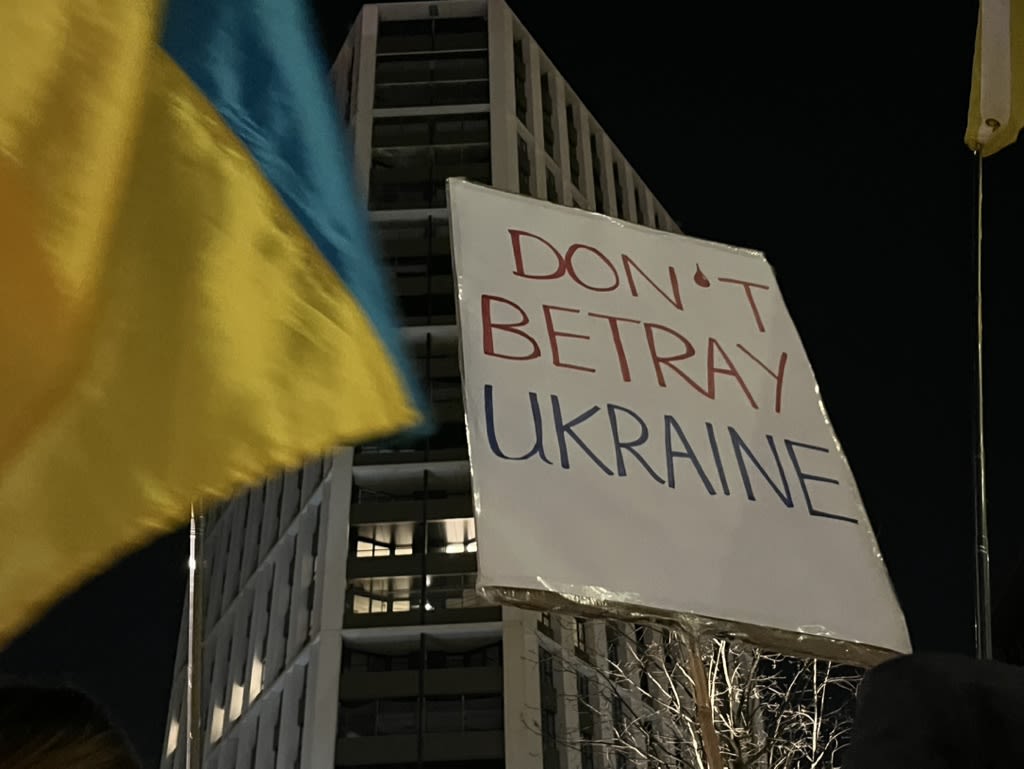
The European Theatre
Collectively, Europe contributes the most in aid to Ukraine. Trump's claims that the US has sent upwards of $300bn appear to be disproportionate as compared independently collected data. The US is still the largest single contributor, however.
(Credit: Henry Langdon)
(Credit: Henry Langdon)
London, United Kingdom
The UK has sent $15.5bn in aid to Ukraine. It remains steadfast in its commitment to the security guarantees of Ukraine. The Prime Minister has said that he wants a "just and lasting " peace.
Berlin, Germany
Germany has spent $18.1bn according to Kiel institute data, the most out of any European nation. The Government is poised to unlock a further €3bn in aid to send to Kyiv.
Coalition of the willing
The NATO Presence remains in central and eastern Europe. However, as the alliance begins to wilt amid pressure from the US, 14 European nations have joined the global 'Coalition of the willing' that pledges renewed support for Ukraine.
UK Prime Minister Kier Starmer announced the partnership in March following a meeting of 18 world leaders.
Many in London, including Labour MP John McDonnell agree that Europe must stand firm in the face of Russian aggression, even if Trump does not provide vital US security guarantees.
Countries highighted with a blue dot are in the Coaltion of the willing
Refugees
The UK is home to 254,000 Ukrainian refugees of the 6.8 million displaced globally since the invasion of Crimea in 2014 according to the Commons Library. A large portion of these refugees are in London.
London Boroughs including Kingston-Upon-Thames have schemes set up to help welcome and assimilate Ukrainians forced to flee their homes.
Kingston is committed to becoming a recognised Borough of Sanctuary that aids vulnerable families and asylum seekers.
MP for Kingston and Surbiton and leader of the Liberal Democrats Ed Davey said: “The British people are ready to welcome refugees with kindness and compassion.”
The story of each Ukrainian refugee is different, but all share the same challenges and sorrows of being torn from their homes.
Nataliia's story
Three years ago, the Mykhailichenko family was living a normal life in Ukraine. They never dreamed of leaving the country they love, but when Russian forces rolled across the border in 2022, everything changed dramatically, virtually overnight.
Suddenly, Nataliia Mykhailichenko had to make a difficult decision about the best way to protect her three children. Fleeing the country quickly became the only option.
Nataliia's family had already been forced to abandon their home once before in 2014, when Russia annexed Crimea. They had made a new life near Irpin, near Kyiv, but once again Nataliia found herself packing essential possessions for herself and her two daughters, Khrystyna who was 16 at the time and Sasha, who was 10. Her son, Danylo was 23, he urged his mother and sisters to leave although he was determined to stay in Ukraine himself.
Nataliia said: "My son insisted that the only way we would be safe was if we left the country. He supported us fully." Nataliia has not seen Danylo for two years now. The two speak regularly however, and in April she plans to return to Kyiv to visit him.
Nataliia, Khrystyna and Sasha first moved to Poland, then shortly left for England to live with a host family in Northumberland with whom they became good friends. However, moving to the UK was not easy for the Mykhailichenkos.
Nataliia balances her job with volunteer work for Save The Children (Credit: Nataliia Mykhailichenko)
Nataliia balances her job with volunteer work for Save The Children (Credit: Nataliia Mykhailichenko)
Nataliia, Khrystyna and Sasha in Irpin in 2020 (Credit: Nataliia Mykhailichenko)
Nataliia, Khrystyna and Sasha in Irpin in 2020 (Credit: Nataliia Mykhailichenko)
Nataliia described how difficult it was moving to the UK without being able to speak English.
It was easier for her daughters however, as Khrystyna spoke English very well and Sasha quickly learned it at school.
Both girls are musical prodigies. Khrystyna was already an internationally renown concert pianist who has given recitals and played with orchestras throughout the world since she was a little girl. Within a year of arriving in the UK, Khrystyna won a four-year scholarship at the Royal Academy of Music in London. Sasha, a violinist, was awarded a coveted full scholarship at the world famous Yehudi Menuhin School in Cobham.
The girls regularly perform at concerts, Khrystyna regularly travels abroad for recitals, including several performances in Ukraine last November. They have also raised money to support the war effort in Ukraine.
With the girls studying in London and Surrey, Nataliia moved to Ealing where she has settled.
The family is totally devoted to classical music and their remarkable ability has helped with their transition to life in England. Nataliia said: "The most important possessions we brought from Ukraine were Sasha’s violin, Khrystyna’s concert dress and sheets of music. Music is as important as fresh air, food and drink. Practising on the piano and violin helped us to think of something other than what we had left behind.”
She added: "I'm proud to live England because I haven't known another country who has supported Ukraine more. I haven't met a single person who told me 'I hate Ukraine', everyone supports us. It's like being with best friends."
When asked whether or not she would like to return to live in Ukraine, Nataliia became emotional. She said: "When you move somewhere from your motherland you have to adapt and get over suffering, fear and hopes. I'm used to living here now, the UK is a very good country for the future of my daughters.
"I couldn't speak English at all. I could only say 'my name is Nataliia.’ It was very difficult because language is power. Without language, you cannot communicate or show your personality or intellect. Suddenly you feel as if you are nothing.”
Khrystyna (left) and Sasha (right) (Credit: Nataliia Mykhailichenko)
Khrystyna (left) and Sasha (right) (Credit: Nataliia Mykhailichenko)
“Of course, I’d like to go to my favourite places in Kyiv, in Irpin, smell the Ukrainian air and see the cherry trees in blossom. But right now, I don't know about living there. Maybe in the future I will go to live out my last years there.”
When Russia invaded Crimea in 2014, Nataliia said that they tried to do everything to protest the occupation but no one listened, and no countries came to help. Now Ukraine relies on US support, which in recent weeks has flickered. If a settlement is forced on Ukraine, Nataliia said that Russia will continue to grab more and more territory.
Protestors in London show support for Ukraine (Credit: Henry Langdon)
Protestors in London show support for Ukraine (Credit: Henry Langdon)
She added: "I am worried about the end of the war. If we give up Odessa, Kharkiv or more places then they will occupy more and more and they will destroy Ukraine.
"There is only one hero in this war. It is not the government, nor the politicians, but the Ukrainian people: ordinary citizens and the soldiers who pick up their guns. They fight for only one reason, and that is to save their families, their country, their land and all our to traditions and history."
US Embassy protest
An emergency demonstration was called on March 5, bringing hundreds to the US Embassy in London to denounce Trump, Putin and the war in Ukraine.
"We will always stand in solidarity with Ukraine and against Putin."
Protestors travelled from across the country to show their disapproval of American foreign policy, just days after the Trump Administration paused aid to Ukraine.
Gathering in front of the largest US Embassy in western Europe, demonstrators spoke with one voice:
"America, wake up."
Oleksii Tyslenko is an 18-year-old Ukrainian who now lives and studies in Bath. He travelled to London for the demonstration at the Embassy and spoke in front of the crowd.
“I check my phone, not for messages from my friends or for university emails, but to see if my loved ones are still alive,” he said.
Tyslenko was dismayed at the pause in US support to Ukraine. “This is a green light to Putin to continue his terror, to bomb more hospitals, schools and homes and kill more Ukrainians,” he said.
He added: “Stopping military aid doesn’t end the war, it helps Russia win it… defending Ukraine is defending European and global security.”
Tyslenko has launched a fund raiser in partnership with the Ukrainian Society at the University of Bath and the Ukrainian Medical Charity to help save lives at Kharkiv children’s hospital, a facility under severe pressure from Russian bombing.
“No fundraiser can stop missiles,” he said, as he called on the US to do more to prevent the deaths of more innocent Ukrainians.
Click on the images below to expand and learn more
Zoe Gardener addressing protestors (Credit: Henry Langdon)
Zoe Gardener addressing protestors (Credit: Henry Langdon)
Oleksii Tyslenko speaking to demonstrators (Credit: Henry Langdon)
Oleksii Tyslenko speaking to demonstrators (Credit: Henry Langdon)
Speakers gave messages in English and Ukrainian (Credit: Henry Langdon)
Speakers gave messages in English and Ukrainian (Credit: Henry Langdon)
The Ukrainian national anthem was sung by protestors (Credit: Henry Langdon)
The Ukrainian national anthem was sung by protestors (Credit: Henry Langdon)
The Ukraine Solidarity Campaign led the event (Credit: Henry Langdon)
The Ukraine Solidarity Campaign led the event (Credit: Henry Langdon)
Demonstrators called for a stop to Trump's UK state visit (Credit: Henry Langdon)
Demonstrators called for a stop to Trump's UK state visit (Credit: Henry Langdon)
Some demonstrators called for frozen Russian assets in London to be seized (Credit: Henry Langdon)
Some demonstrators called for frozen Russian assets in London to be seized (Credit: Henry Langdon)

